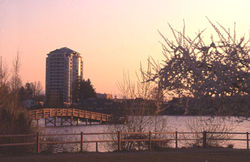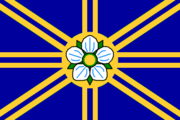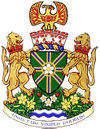Abbotsford, British Columbia
| City of Abbotsford | |||
|---|---|---|---|
 |
|||
|
|||
| Nickname(s): City in the Country, Raspberry Capital of Canada | |||
| Motto: "Unus Cum Viribus Duorum" (Latin) "One with the strength of two" |
|||
| Coordinates: | |||
| Country | |||
| Province | |||
| Region | Fraser Valley/Lower Mainland | ||
| Regional District | Fraser Valley Regional District | ||
| Founded | 1892 | ||
| Incorporated | 1945 | ||
| Government | |||
| - Mayor | George W. Peary | ||
| Area | |||
| - City | 359.36 km2 (138.7 sq mi) | ||
| Elevation | 38 m (124 ft) | ||
| Population (2006) | |||
| - City | 123,864 | ||
| - Density | 344.7/km2 (892.8/sq mi) | ||
| - Metro | 159,020 (Census Metropolitan Area) | ||
| - Demonym | Abbotsfordian | ||
| Time zone | PST (UTC-8) | ||
| - Summer (DST) | PDT (UTC-7) | ||
| Area code(s) | 604, 778 | ||
| Website | http://www.abbotsford.ca | ||
Abbotsford is a Canadian city located in the Fraser Valley of British Columbia, adjacent to Metro Vancouver. It is the 5th largest municipality in British Columbia, home to 123,864 people (2006).[1] Its Census Metropolitan Area is the 23rd largest in Canada, with 159,020 people (2006).[1]
Abbotsford is the largest municipality by area in British Columbia.[2] It is home to the University of the Fraser Valley and Abbotsford International Airport, which hosts the Abbotsford International Airshow.
The municipality's southern boundary is the Canada-US border, across which is Sumas in the state of Washington. In Canada, it is bordered by Langley to the west, the Fraser River and Mission to the north, and Chilliwack to the east. Much of Abbotsford has dramatic views of Mount Baker (to the southeast) and the Coast Mountains (to the north).
Contents |
History

Abbotsford's colonial development began when the Royal Engineers surveyed the area in response to the Gold Rush along the Fraser River in 1858. This led to the building of Yale Road (today Old Yale Road), the first transportation route to link the Fraser Valley. Settlement grew and the production of butter, milk and tobacco began by the late 1860s. In 1889 former Royal Engineer John Cunningham Maclure applied for a crown grant to obtain the 160 acres (0.65 km2) that would become Abbotsford.
The Maclures named the land Abbotsford after family friend Harry Abbott, the Western Superintendent of the Canadian Pacific Railway.[3] The title passed hands to Robert Ward, who filed a town site subdivision on July 9, 1891. Also in 1891, the CPR built a railway line through the area that connected Mission with Sumas. This route was the only rail connection between Vancouver and Seattle until 1904.
The Village of Abbotsford was incorporated in 1892. At that time Robert Ward sold many of the lots to private investors, but also sold off a significant portion to the Great Northern Railway’s subsidiary company the Vancouver, Victoria and Eastern Railway. The British Columbia Electric Railway (BCER) arrived in 1910. The Interurban, as the BCER tram linking Abbotsford with Vancouver and Chilliwack was called, was discontinued in 1950, but BCER's successor BC Hydro retains the right to re-introduce passenger rail service. Service to Vancouver currently runs from neighbouring Mission by way of the West Coast Express.
The most notable natural disaster to hit Abbotsford was a major flood in 1948.
1972 saw the amalgamation of the Village of Abbotsford and the District of Sumas into the District of Abbotsford. The District of Abbotsford amalgamated with the District of Matsqui in 1995 to become the City of Abbotsford.
Government
The City of Abbotsford uses a Council-Manager system of local government. The current Mayor and Council were elected on November 15, 2008. The current mayor is George W. Peary. Councillors elected in 2008 are: Patricia Ross (9% of popular vote), Lynne Harris (8%), Moe Gill (8%), John Smith (7%), Simon Gibson (6%), Les Barkman (6%), Dave Loewen (6%), and Bill MacGregor (6%). School trustees elected are: Joanne Field, Korky Neufeld, Shirley Wilson, Cindy Schafer, John R. Sutherland, Uultsje DeJong, and Preet S. Rai.[4]
The Abbotsford flag and coat of arms are the same, featuring straight, diagonal crosses representing Abbotsford as at a "crossroads". At the centre is a strawberry blossom to symbolize the local berry industry. The flag of Abbotsford was originally blue in colour. The change to green was initiated in 1995 when the District of Abbotsford and the District of Matsqui amalgamated to create the City of Abbotsford.
Demographics
| Census | Population |
|---|---|
| 1911 | 300 |
| 1931 | 510 |
| 1941 | 562 |
| 1951 | 785 |
| 1961 | 888 |
| 1971 | 706 |
| 1981 | 12,745 |
| 1991 | 18,864 |
| 2001 | 115,463 |
| 2006 | 123,864 |
| Est. 2007 | 131,827 |
Abbotsford has the 3rd highest proportion of visible minorities among Census Metropolitan Areas in Canada, after the Greater Toronto Area and Metro Vancouver.[5]
The largest racial group is European Caucasian, comprising approximately 73.6% of the population. This group includes German, Dutch, British, Irish, Scandinavian and Slavic ethnic origins.[6] The next largest racial group in Abbotsford is South Asian (countries of India, Pakistan, Bangladesh and Sri Lanka) comprising 19.1% of the population. This is followed by Aboriginals at 2.9% of the population (which includes indigenous peoples from other parts of Canada and the United States) and Chinese at 1.69%.
26.1% of the city's population was born outside of Canada. Of that percentage, a majority is from South Asia, followed by groups from South Korea, Southeast Asia, China and Latin America. English is the primary language spoken, with 78.7% of the population having it as their first language.
Abbotsford's largest religious group is Christian at 61.4% of the population. The Lutheran and Anabaptist (Mennonite Brethren and Mennonite Church) denominations make up the largest congregations. The next largest religious group is Sikh, comprising 13.4% of the population. The city contains the first Sikh Gurdwara built in Canada (in 1911), which is also the oldest in North America. It is now a historical site in Abbotsford.
Quick facts
- Population (2007): 131,827
- % Change (2001–2006): 7.2
- Resident labour force (2001): 58,140
- Dwellings (2006): 45,286
- Area (km2): 359.36
- Density (persons per km2) (2006): 344.7
- Gross income of population (2002): $2,337,376,686
- Average household income (2001): $56,165
- Average individual income (2001): $26,794
Climate
| Climate data for Abbotsford | |||||||||||||
|---|---|---|---|---|---|---|---|---|---|---|---|---|---|
| Month | Jan | Feb | Mar | Apr | May | Jun | Jul | Aug | Sep | Oct | Nov | Dec | Year |
| Record high °C (°F) | 17.7 (63.9) |
20.6 (69.1) |
24.9 (76.8) |
29.8 (85.6) |
36 (97) |
34.7 (94.5) |
37.8 (100) |
36.3 (97.3) |
37.5 (99.5) |
29.3 (84.7) |
20.6 (69.1) |
18.2 (64.8) |
37.8 (100) |
| Average high °C (°F) | 5.8 (42.4) |
8.5 (47.3) |
11.3 (52.3) |
14.5 (58.1) |
17.8 (64) |
20.3 (68.5) |
23.4 (74.1) |
23.8 (74.8) |
21 (70) |
15 (59) |
9.1 (48.4) |
5.9 (42.6) |
14.7 (58.5) |
| Daily mean °C (°F) | 2.6 (36.7) |
4.7 (40.5) |
6.8 (44.2) |
9.5 (49.1) |
12.5 (54.5) |
15.1 (59.2) |
17.5 (63.5) |
17.7 (63.9) |
15 (59) |
10.2 (50.4) |
5.7 (42.3) |
2.8 (37) |
10 (50) |
| Average low °C (°F) | -0.6 (30.9) |
0.8 (33.4) |
2.3 (36.1) |
4.4 (39.9) |
7.2 (45) |
9.9 (49.8) |
11.5 (52.7) |
11.5 (52.7) |
8.8 (47.8) |
5.4 (41.7) |
2.3 (36.1) |
-0.3 (31.5) |
5.3 (41.5) |
| Record low °C (°F) | -21.1 (-6) |
-18.9 (-2) |
-12.8 (9) |
-4.4 (24.1) |
-2.2 (28) |
1.1 (34) |
2.2 (36) |
3.3 (37.9) |
-1.7 (28.9) |
-7.5 (18.5) |
-16.7 (1.9) |
-20 (-4) |
-21.1 (-6) |
| Precipitation mm (inches) | 198.1 (7.799) |
160.3 (6.311) |
146.4 (5.764) |
120.2 (4.732) |
99.1 (3.902) |
78.9 (3.106) |
50.2 (1.976) |
49.3 (1.941) |
75.9 (2.988) |
145.3 (5.72) |
240.9 (9.484) |
208.6 (8.213) |
1,573.2 (61.937) |
| Sunshine hours | 67.2 | 89.9 | 126 | 168.5 | 210.2 | 215.4 | 282.6 | 256 | 193.7 | 127 | 66.6 | 62.8 | 1,865.9 |
| Source: Environment Canada[7] | |||||||||||||
Economy
62% of employed Abbotsford residents work in the city of Abbotsford itself. Most of the remaining 38% commutes to Mission, Chilliwack or to Vancouver and its suburbs (primarily Surrey and Langley).[8]
More than 25% of Abbotsford's work force commutes to Abbotsford from other municipalities.[8]
The Conference Board of Canada has identified the local economy as one of the most diverse in the country.[9] Abbotsford's main industries are agriculture, transportation, manufacturing and retail. The city earns the highest dollar per acre of agricultural land in the country, greater than the Niagara Region and the North Okanagan.[9] The city is home to three federal prisons, each of which employs between 200 and 500 officers and support staff. There is also a growing aerospace industry led by Cascade Aerospace and Conair Group Inc.
Education
Public elementary, middle, and secondary schools are administered by School District 34 Abbotsford. Private schools include St. John Brebeuf Regional Secondary, Mennonite Educational Institute, Abbotsford Christian School and the Dasmesh Punjabi School.
Post Secondary institutions in the city include the University of the Fraser Valley, religious institutions such as Columbia Bible College and Summit Pacific College, as well as career colleges such as Career Gate Community College, Sprott Shaw Community College, Vancouver Career College, Metis Skills & Employment Centre, and CDI College.
There is also a virtual school called "Abbotsford Virtual School" that offers more than 30 semestered online courses. This school offers a unique Animation and Modeling program that teaches students aspects of the video gaming industry.
Transportation
Public bus transportation is provided by the regional transit system ValleyMAX. Passenger rail service to Vancouver currently runs from nearby Mission by way of the West Coast Express.
Air links are provided by the Abbotsford International Airport. The airport is one of the fastest growing commercial airports in western Canada, and acts as a reliever airport for Vancouver International Airport. WestJet provides regular scheduled service from the airport, due to its proximity to Vancouver's eastern suburbs. The airport is also the home of the annual Abbotsford International Airshow.
Major transportation routes leading into Abbotsford are the Trans-Canada Highway (#1), Abbotsford-Mission Highway (#11) and the Fraser Highway (#1A). Access to the United States is via the Huntingdon border crossing.
Media
Due to its proximity to Vancouver, most TV and radio broadcasters in that city are also received throughout the valley, although as noted below in a few cases there are repeater stations licensed to different centres in the region. Some media from Washington, USA is also received in the Fraser Valley due to its proximity to the border.
Sports
The NHL's Calgary Flames have relocated their AHL affiliate to Abbotsford.[10] The American Hockey League approved the franchise relocation on April 28, 2009,[11] and on May 14 of that year, the team name was announced as the Abbotsford Heat.[12]
Abbotsford's Jane and Gerry Swan Track at Rotary Stadium is home to the Valley Royals Track & Field Club, who have produced numerous Olympians including two for the 2008 Olympics. Rotary Stadium is also home to the Canadian Junior Football League's Abbotsford Air Force; however, the Air Force fell into non-playing status for the 2007 and 2008 seasons.
The Abbotsford Pilots of the Pacific International Junior Hockey League (Junior B level) play at MSA Arena, which is Abbotsford's 2nd largest arena at just over 400 seats. Abbotsford was considered as a possible home for the Chilliwack Chiefs (Junior A), who were forced to move in 2006 when the Chilliwack Bruins (a WHL expansion team) took over their arena, Prospera Centre. Abbotsford would have become the home of the Chiefs if the city had supported them in building a new arena; instead, the Chiefs moved to Langley. Ironically, construction has now been completed in Abbotsford on a far bigger sports & entertainment centre (with 7,500 seats).[13]
Abbotsford Minor Hockey is one of the largest associations in British Columbia with more than 1000 players registered from the ages of 5 through 18 years old. This association is recognized by many as a model and a leader in the development of minor hockey programs, and several Abbotsford-raised players have gone on to the highest levels of this sport. In the 2005-2006 hockey season, Abbotsford's Bantam AAA team were ultimately the Western Canadian Bantam Champions, and eight individual players from this team (the most ever) were selected in the 2006 WHL Bantam Draft. <http://www.abbotsfordminorhockey.com/>
Abbotsford has a superior Youth soccer program, winning 2 national titles, and numerous provincial titles. It is also home of soccer all stars Sophie Schmidt, Brad Petoom and Adam Lang. Abbotsford is home to the Abbotsford Mariners of the United Soccer Leagues Premier Development League, the highest level of amateur soccer in North America.
Abbotsford is home to many high school sports, with Abbotsford Collegiate, W.J. Mouat Secondary, Rick Hansen Secondary, Robert Bateman Secondary, Yale Secondary, and the Mennonite Educational Institute, among others, doing very well in track and field, volleyball, basketball, and football. These schools have consistently ranked among the highest in the province. The Yale Secondary Senior Boys Basketball Team, under Coach Al Friesen, won the 2008 ‘AAA’ provincial boys' basketball championship.[14]
Abbotsford's rugby club supports three men's teams, two women's teams, U19 men's and women's, U15 U16 and U17 men's, and a great mini rugby program. Many of Abbotsford's players have gone on to play for Canada, such as Erin Lockwood, Ryan McWhinney, Scott Hunter, Bryn Keys, and Brodie Henderson.[15]
In Olympic sports, Abbotsford's Alana Kraus has won medals in short-track speed skating.
| Club | League | Sport | Venue | Established | Championships |
|---|---|---|---|---|---|
| Abbotsford Heat |
|
Ice hockey | Abbotsford Entertainment & Sports Centre |
|
|
| Abbotsford Pilots |
|
Ice hockey | MSA Arena |
|
|
| Abbotsford Mariners |
|
Soccer | Bateman Park |
|
|
| Abbotsford RFC |
|
Rugby | CFV Exhibition Park |
|
|
Police
As of July 20, 2006, the Abbotsford metropolitan area as defined by Census Canada (which includes Mission) had the highest property crime rate and the second highest violent crime rate for cities with a population of 100,000 to 500,000 in Canada.[16].
The City of Abbotsford has its own municipal police force, one of eleven municipal police forces in British Columbia. It is the third largest municipal police force in British Columbia (behind Vancouver and Victoria). As of 2006, the Abbotsford Police Department employed nearly 200 officers and 80 civilian employees.
The Abbotsford Police Department was officially formed in 1995 when the District of Matsqui and the District of Abbotsford amalgamated to become the City of Abbotsford. Prior to the amalgamation, the District of Matsqui was patrolled by the Matsqui Police and the District of Abbotsford by the RCMP. During the referendum citizens elected to keep a municipal police force.
The Abbotsford Police Department were involved in the investigation and arrest of the "Abbotsford killer" Terry Driver.[17]
Areas
These places represent parts of the city that have more than one neighbourhood in them.
- Abbotsford East
- Abbotsford West
- Aberdeen
- Bradner
- Central Abbotsford
- Matsqui
- Poplar
- Sumas Mountain
- Sumas Prairie
Neighbourhoods
- Aberdeen
- Arnold
- Auguston
- Blueridge
- Bradner
- Clayburn
- Clearbrook
- Downtown
- Eagle Mountain
- Gifford
- Glen Mountain
- Huntingdon
- Kilgard
- Matsqui
- Mount Lehman
- North Poplar
- Peardonville
- Sandy Hill
- South Poplar
- Straiton
- Townline
Neighbouring communities
 |
Maple Ridge | Mission | Dewdney/Deroche |  |
| Township of Langley (Aldergrove) | Chilliwack | |||
| Lynden, Washington | Sumas, Washington Everson, Washington |
Maple Falls, Washington |
Sister cities
 Fukagawa, Hokkaidō, Japan
Fukagawa, Hokkaidō, Japan
Notable residents
- Karen-Lee Batten
- Jonny Craig
- Ryan Craig
- Kyle Cumiskey
- Brian Doerksen
- Michael Funk
- Jacob Hoggard
- Chad Kroeger
- Brad Moran
- Greg Neufeld
- Larry Nickel
- Jim Playfair
- Gladys Powers
- David Van der Gulik
- Shane Wiebe
- Evangeline Lilly
- Jordan Pritchett
References
- ↑ 1.0 1.1 Population and dwelling counts, for Canada, census metropolitan areas, census agglomerations and census subdivisions (municipalities), 2006 and 2001 censuses - 100% data
- ↑ List of the 100 largest cities and towns in Canada by area
- ↑ History of Abbotsford
- ↑ 2008 Election Results
- ↑ "B.C. is nation's most ethnically diverse province: StatsCan". CBC News. 2008-04-02. http://www.cbc.ca/canada/british-columbia/story/2008/04/02/bc-most-diverse-province.html.
- ↑ Profile of Ethnic Origin and Visible Minorities for Census Metropolitan Areas and Census Agglomerations, 2006 Census, Census Canada/Statistics Canada
- ↑ Environment Canada Canadian Climate Normals 1971–2000, accessed 14 July 2010
- ↑ 8.0 8.1 [1]
- ↑ 9.0 9.1 [2]
- ↑ Hall, Vicki (2009-03-12). "Flames' farm team set to move to Abbotsford". Vancouver Province. http://www.theprovince.com/sports/soccer/Flames+farm+team+move+Abbotsford/1382018/story.html. Retrieved 2009-03-16.
- ↑ [3]
- ↑ "The HEAT is on for 2009-10 AHL season". Fraser Valley Sports & Entertainment Ltd.. 2009-05-14. http://www.fraservalleyahl.com/2009-05-14-news.pdf. Retrieved 2009-05-14.
- ↑ Abbotsford sports website
- ↑ 2008 AAA Boys Provincials
- ↑ http://www.abbotsfordrugby.com/ Abbotsford Rugby website
- ↑ Abbotsford is Canada's theft capital
- ↑ Scott Steele (May 20, 1996), "Abbotsford Killer Arrested", Maclean's (The Canadian Encyclopedia), http://www.thecanadianencyclopedia.com/index.cfm?PgNm=TCE&Params=M1ARTM0010672, retrieved 2009-06-28
External links
|
|||||||||||||||||
|
|||||

